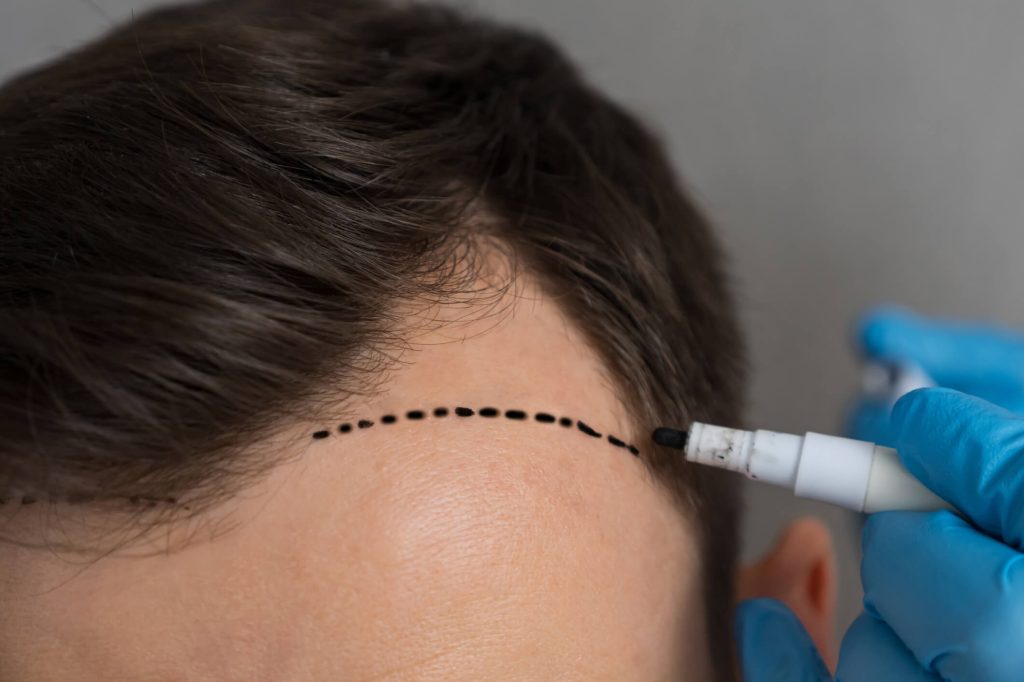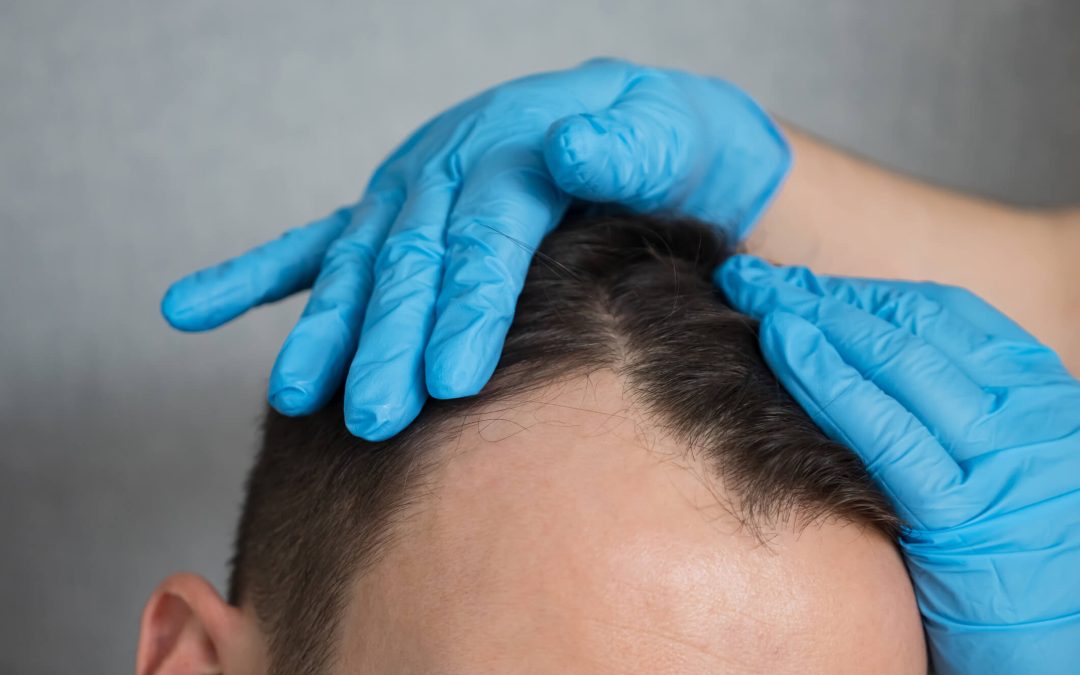Hair loss can affect people at various stages of life, and deciding on the best age to undergo a hair transplant is a significant consideration. Here’s a detailed look at the factors influencing the best age to get a hair transplant:
Factors to Consider When Deciding on a Hair Transplant
Deciding whether to undergo a hair transplant involves careful consideration of several factors to ensure the best possible outcome. Here are key factors to weigh when making this decision:
1. Extent and Stability of Hair Loss – The extent and stability of hair loss are crucial factors. Hair transplants are most effective for individuals with stable hair loss patterns. Assessing whether your hair loss has stabilized or is likely to progress further helps determine if you’re a suitable candidate. A consultation with a hair transplant specialist can provide insight into your specific situation.
2. Age and General Health – Age is an important consideration in hair transplant candidacy. While there is no strict age limit, younger individuals should ensure their hair loss pattern has stabilized before considering surgery. Older individuals should be in good overall health to undergo the procedure safely. Medical conditions and medications that could affect healing should also be discussed with your doctor.
3. Expectations and Realistic Goals – Having realistic expectations about the outcome of a hair transplant is essential. While modern techniques can produce natural-looking results, it’s important to understand that a hair transplant may not restore a full head of hair to its original density. A thorough consultation with a specialist can help set achievable goals based on your individual hair loss pattern and donor hair availability.
4. Type of Hair Loss – Different types of hair loss may require different approaches to hair transplant surgery. For instance, individuals with male or female pattern baldness typically make good candidates for FUE and FUT; follicular unit transplantation (FUT) or follicular unit extraction (FUE). Other conditions, such as alopecia areata, may require a different approach or additional treatment considerations.
5. Financial Considerations – Hair transplant surgery can be a significant investment. Understanding the cost involved, including potential additional procedures or follow-up treatments, is important. Some health insurance plans may cover certain aspects of hair restoration if deemed medically necessary, so checking with your provider is advisable.
6. Hair Transplant Techniques – Advancements in hair transplant techniques, such as FUE and robotic-assisted procedures, offer different benefits and considerations. Understanding these techniques and how they apply to your specific needs can help you make an informed decision. Discussing the pros and cons of each technique with your surgeon can clarify which option is best suited to achieve your desired results.
7. Recovery and Aftercare – Understanding the recovery process and hair transplant aftercare requirements is crucial. Hair transplant surgery involves a recovery timeline during which you’ll need to follow specific instructions to optimize healing and ensure the success of the procedure. Planning for time off work or other commitments during the initial recovery phase is important for a smooth recuperation.
8. Consultation with a Specialist – Ultimately, consulting with a qualified hair transplant specialist is the most important step in deciding whether to proceed with surgery. A specialist can assess your individual circumstances, discuss your goals, and recommend a personalized treatment plan that addresses your specific needs and concerns.
By carefully considering these factors and consulting with a knowledgeable specialist, you can make an informed decision about whether a hair transplant is the right choice for you. This approach ensures that you achieve the best possible results and satisfaction from your hair restoration journey.
Ideal Candidates for Hair Transplant Surgery
Choosing to undergo a hair transplant is a significant decision that requires careful consideration of several factors. Ideal candidates for hair transplant surgery typically exhibit the following characteristics:
1. Age 25-65
The age range of 25 to 65 years old is typically considered optimal for hair transplant candidates. Here’s why:
- Stable Pattern of Hair Loss – By age 25, many individuals have reached a stable pattern of hair loss. This stability is crucial for ensuring that the transplanted hair remains in place and continues to grow effectively over time. Younger individuals may still experience fluctuating hair loss patterns, making it challenging to predict the long-term success of a transplant.
- Realistic Expectations – Individuals in this age range are more likely to have realistic expectations regarding the outcomes of a hair transplant. They understand that while the procedure can restore hair in balding areas, it may not achieve the density of hair they had in their youth. Older individuals up to 65 can also benefit, provided they are in good health and have realistic expectations about what the procedure can achieve.
2. Stable Hair Loss
The ideal candidate for a hair transplant has experienced stable hair loss, meaning that their hair loss pattern has not significantly changed for at least a year. This stability ensures that the transplant results will be predictable and that the transplanted hair will not be affected by ongoing hair loss in surrounding areas.
3. Good Health
Candidates should be in good overall health to undergo a hair transplant procedure successfully. Good health reduces the risk of complications during and after surgery, promotes faster healing, and ensures optimal growth of transplanted hair follicles. Medical conditions that could complicate surgery or affect healing should be evaluated and managed before considering a hair transplant.
Individuals aged 25 to 65 with stable hair loss patterns and good overall health are typically the best candidates for hair transplants. They are more likely to achieve satisfactory results and experience the benefits of restored hair density and improved appearance. Consulting with a qualified hair transplant specialist can provide personalized advice based on individual circumstances and help determine if a hair transplant is the right choice.

Considerations for Younger Candidates
Younger individuals contemplating a hair transplant face unique considerations compared to older candidates. Here are key factors to ponder before deciding on hair restoration surgery:
1. Long-Term Planning – Hair loss is often progressive. Younger candidates should consider the long-term implications of their procedure. While a hair transplant can restore hair in thinning areas of the scalp, it does not prevent future hair loss. Planning for potential future treatments or maintenance sessions is essential to maintain desired results over time.
2. Future Hair Loss Expectations – Predicting the rate and severity of future hair loss is challenging but crucial. Surgeons assess family history, current hair thinning pattern, and potential progression to determine the suitability of the patient for hair transplant procedures. Younger patients may require additional surgeries as hair loss progresses, making ongoing communication with their hair transplant surgeon critical.
3. Realistic Expectations – Managing expectations is vital for all candidates, but especially for younger individuals. A hair transplant can significantly improve density and coverage in balding areas, but it may not restore the same quality of hair as seen in their earlier years. Discussing achievable outcomes and setting realistic goals with the surgeon ensures satisfaction with the results.
4. Psychological Readiness – Hair loss can impact self-esteem, particularly in younger men and women. While a hair transplant can boost confidence, candidates must be emotionally prepared for the procedure and its potential risks. Counseling or support groups can provide valuable information in coping with hair thinning and decision-making regarding hair transplant treatment.
5. Age and Health Considerations – While there is no strict age limit for hair transplants, younger candidates should generally be over 25 and in good health. This ensures that their hair loss condition has stabilized, reducing the likelihood of needing additional surgeries due to ongoing hair loss. Good overall health supports optimal healing and reduces the risks associated with hair restoration surgery.
6. Consulting with Experts – Seeking consultation with a qualified hair transplant surgeon is crucial for younger candidates. Specialists can evaluate individual hair loss conditions, discuss realistic expectations, and recommend suitable hair restoration treatments tailored to the patient’s unique needs. Their expertise ensures that candidates make informed decisions about their hair restoration journey.
7. Cost Considerations – Hair transplants can be a significant investment, and younger individuals should consider the financial implications of initial procedures and potential future treatments. Understanding costs and financing options helps candidates plan for the financial aspect of their hair restoration treatment.
By carefully considering these factors, younger candidates can make informed decisions about hair transplant surgery. Consulting with a reputable hair transplant surgeon ensures that treatment aligns with their goals for hair restoration and long-term satisfaction with the results.
Benefits of Early Intervention
Early intervention in hair transplant surgery offers several significant benefits, making it a compelling option for individuals experiencing hair loss:
1. Prevents Advanced Balding – Addressing hair loss early prevents it from progressing to advanced stages of balding. By intervening when hair loss is still moderate, a hair transplant can effectively restore hair density and coverage before significant areas of the scalp become completely bald.
2. Natural-Looking Results – Early intervention allows for more natural-looking results. Hair transplants redistribute existing, healthy hair follicles to balding areas. When done early, there are usually enough donor follicles available to create a natural hairline and achieve seamless integration with existing hair.
3. Boosts Self-Confidence – Hair loss can significantly impact self-esteem and confidence. Addressing hair loss early through a transplant can restore a person’s youthful appearance and improve self-confidence. Feeling more comfortable with one’s appearance can positively influence social interactions and overall quality of life.
4. Long-Term Cost Savings – Early intervention in hair transplant surgery can potentially save costs in the long term. By addressing hair loss before it progresses extensively, individuals may require fewer procedures or maintenance treatments over time. This can be more cost-effective compared to waiting until hair loss has advanced significantly.
5. Psychological Well-Being – Dealing with hair loss can cause emotional distress, especially when it occurs at a young age. Early intervention not only addresses physical appearance but also supports psychological well-being. It allows individuals to regain a sense of control over their appearance and reduces anxiety related to hair loss.
6. Preserves Existing Hair – Hair transplants do not prevent future hair loss, but they can preserve existing, healthy hair in areas prone to thinning. By strategically placing transplanted hair, the procedure can enhance overall hair density and coverage, preserving the natural hair that remains.
7. Customized Treatment Plans – Early consultation with a hair transplant specialist enables the development of a personalized treatment plan. This plan can include considerations for future hair loss, potential follow-up procedures, and complementary treatments to maintain results over time.
Early intervention in hair transplant surgery offers multiple advantages, from preventing advanced balding and achieving natural-looking results to boosting self-confidence and potentially saving costs in the long term. Consulting with a qualified hair transplant specialist early on can provide personalized guidance and ensure optimal outcomes tailored to individual needs and goals.
Conclusion
Deciding on the optimal age for a hair transplant requires evaluating factors like hair loss severity, age, overall health, and psychological readiness. Seeking guidance from a skilled hair transplant specialist ensures personalized advice, enhancing outcomes tailored to individual needs.
Whether you’re in your twenties or nearing retirement, comprehending your specific hair loss pattern and consulting with a specialist are essential for making a well-informed choice about hair transplantation, particularly concerning the donor area and FUE hair transplant techniques.
Consult with Neograft Hair Restoration Orange County Today!
Determining the best age to get a hair transplant is a significant decision, and at Neograft Hair Restoration Orange County, led by Dr. George Brennan in Newport Beach, California, we are committed to guiding you through this process. Whether you’re noticing early hair loss in your twenties or considering restoration later in life, our specialized hair replacement procedures cater to your unique needs. With expertise in advanced techniques that ensure natural-looking results, we prioritize personalized consultations to address all aspects of your treatment journey—from evaluating candidacy and understanding procedure options to discussing hairline design, follicle density, and donor grafts.
Our experienced surgeon and high success rates make us your trusted partner in achieving the best outcomes for hair transplants. Take the first step towards reclaiming your confidence and exploring effective hair loss solutions. Contact us today at (949) 644-3592 and schedule your consultation with Neograft Hair Restoration Orange County!



Recent Comments